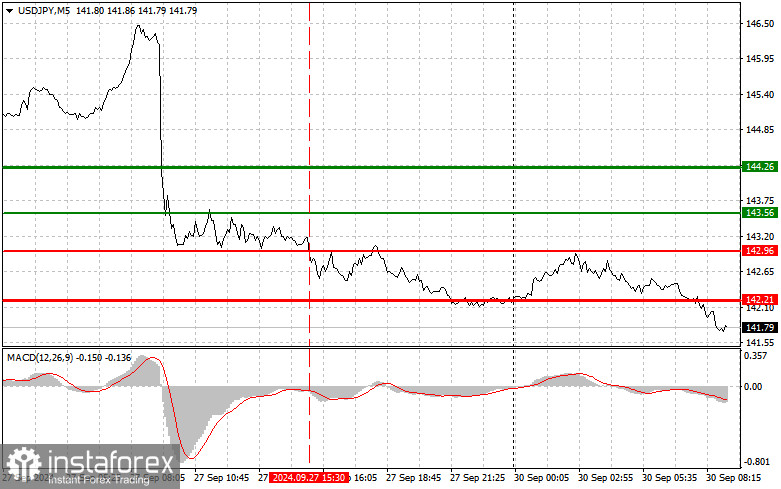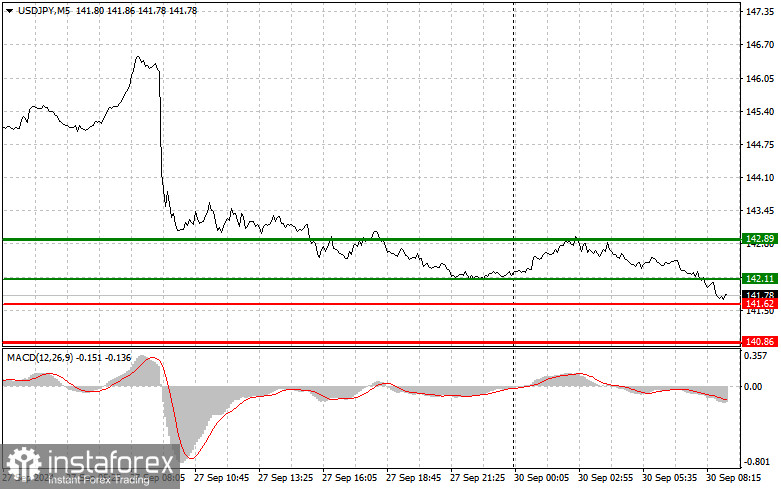Trade Analysis and Tips for Trading the Japanese Yen
The test of the 142.96 price occurred when the MACD indicator had moved significantly downward from the zero mark, so I refrained from selling at the end of the week despite the strong downward movement in the dollar. As a result, the pair, although sluggishly, moved down another 50 pips. Today's weak reports on changes in Japan's industrial production were offset by good retail trade volume results, strengthening the Japanese yen and weakening the dollar's position. However, given that today is the last trading day in September, be cautious when selling at the current lows. It's best to take advantage of corrections and then act on the trend. Regarding the intraday strategy, I will mostly rely on the implementation of scenarios #1 and #2.

Buy Signal
Scenario #1: Today, I plan to buy USD/JPY when reaching the entry point at 142.11 (green line on the chart) with a target of rising to the 142.89 level (thicker green line on the chart). Around the 142.89 level, I intend to exit the buy positions and open sell positions in the opposite direction (expecting a movement of 30-35 pips in the opposite direction from this level). The pair's growth today can be expected only as part of a correction. Important! Before buying, ensure the MACD indicator is above the zero mark and is just beginning to rise.
Scenario #2: I also plan to buy USD/JPY today if the price of 141.62 is tested twice consecutively when the MACD indicator is in the oversold area. This will limit the pair's downward potential and lead to an upward market reversal. Growth to the opposite levels of 142.11 and 142.89 can be expected.
Sell Signal
Scenario #1: Today, I plan to sell USD/JPY only after the 141.62 level is tested (red line on the chart), which will lead to a rapid decline of the pair. The key target for sellers will be the 140.86 level, where I intend to exit the sell positions and immediately open buy positions in the opposite direction (expecting a movement of 20-25 pips in the opposite direction from this level). Pressure on the pair will continue within the framework of the bearish market for the dollar. Important! Before selling, ensure that the MACD indicator is below the zero mark and is just beginning to decline.
Scenario #2: I also plan to sell USD/JPY today if the price of 142.11 is tested twice consecutively when the MACD indicator is in the overbought area. This will limit the pair's upward potential and lead to a downward market reversal. A decline to the opposite levels of 141.62 and 140.86 can be expected.

What's on the Chart:
Thin green line: Entry price at which you can buy the trading instrument.
Thick green line: The anticipated price where you can set Take Profit or manually lock in profits, as further growth above this level is unlikely.
Thin red line: Entry price at which you can sell the trading instrument.
Thick red line: The anticipated price where you can set Take Profit or manually lock in profits, as further decline below this level is unlikely.
MACD Indicator: When entering the market, it is important to be guided by overbought and oversold zones.
Important: Novice traders in the forex market should be cautious when making market entry decisions. It is best to stay out of the market before the release of important fundamental reports to avoid sudden exchange rate fluctuations. If you decide to trade during news releases, always set stop orders to minimize losses. You can quickly lose your entire deposit without stop orders, especially if you do not use money management and trade in large volumes.
And remember, for successful trading, you need to have a clear trading plan, like the one presented above. Spontaneous trading decisions based on the current market situation are initially a losing strategy for an intraday trader.





















